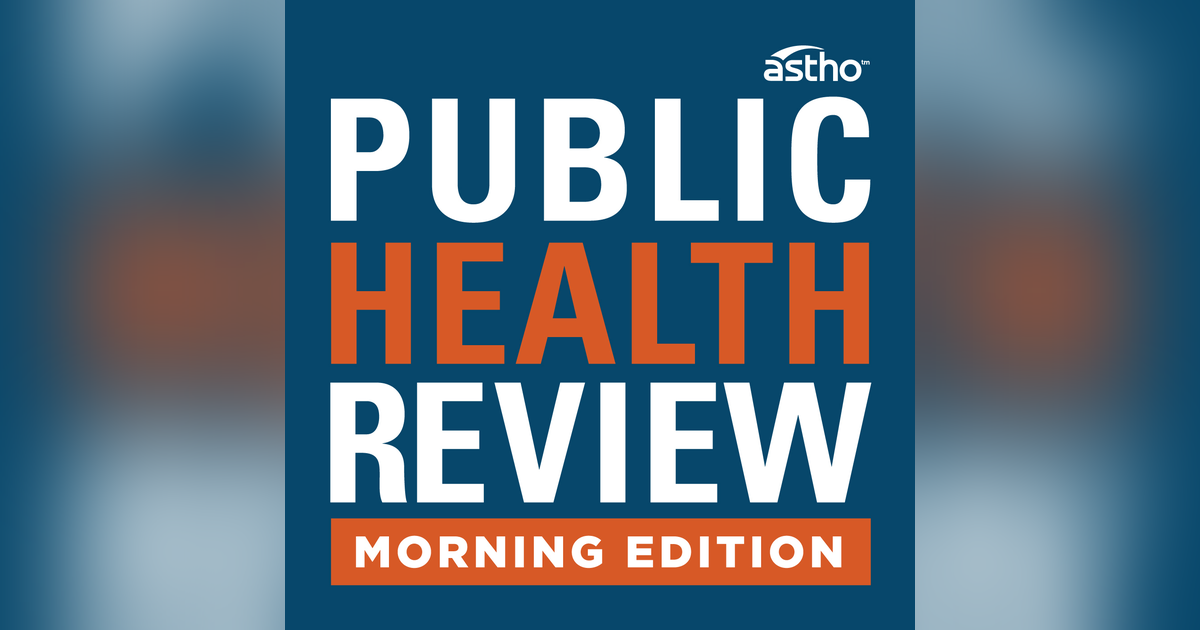Dr. Susan Kansagra, North Carolina State Health Officer and Assistant Secretary for Public Health, discusses disparities in the Monkeypox response; Meredith Alexander, Senior Analyst for Performance Excellence, explains how the Senior Leader Reserve...
Dr. Susan Kansagra, North Carolina State Health Officer and Assistant Secretary for Public Health, discusses disparities in the Monkeypox response; Meredith Alexander, Senior Analyst for Performance Excellence, explains how the Senior Leader Reserve Corps can assist ASTHO members looking for extra help with a project; and ASTHO’s new Speakers Bureau is ready to help you find an expert for your next event.
ASTHO Webpage: Senior Leader Reserve Corps
ROEBRT JOHNSON:
This is Public Health Review Morning Edition for Thursday, September 1st, 2022. I'm Robert Johnson.
Now, today's news from the Association of State and Territorial Health Officials.
SUSAN KANSAGRA:
We're seeing that nearly all cases are in men who have sex with men, but specifically what we're seeing in our state is that 70% of those individuals that we have recorded now as being diagnosed with monkeypox are Black. So, certainly we're seeing just a disproportionate impact on that community.
JOHNSON:
North Carolina state health officer Dr. Susan Kansagra noting disparities in the monkeypox outbreak and the work done in her state to help those who've born the worst of it.
KANSAGRA:
Yeah, so, we are trying to make sure that when you're getting the vaccine out to those communities at highest risk—and we know certainly, especially because vaccine supplier overall for our country is fairly limited—we want to make sure is. And that involves partnerships and a lot of building community relationships with the organizations and with the partners we now are serving the community already.
JOHNSON:
Kansagra says her team is reaching people in many ways.
KANSAGRA:
Some people—if you have a clinic that is geared towards those that are eligible, you know, on a weekend—some people will come to that. But some people will not want to come to that because that, again, might be done in a way that they're not comfortable, you know, being identified. And they'd rather go into a clinic in a way that, you know, you might make a routine appointment for anything else and go into a clinic and make an appointment.
JOHNSON:
Kansagra says everything is considered including questions about treatment eligibility.
KANSAGRA:
You know, if we think about eligibility criteria and doing that in a way that, again, we are maintaining people's confidentiality and privacy and not, you know, and again, doing in a way that makes it very easy.
So, rather than asking people, "You know, okay, do you meet this criteria? Do you meet the second criteria?" Do we need an easier way saying, "Look, these are the criteria. Do you feel you're eligible based on these?" And asking a single question and making it really comfortable for them.
JOHNSON:
Kansagra adds COVID-19 has provided many lessons now guiding the response to monkeypox.
KANSAGRA:
No, we know that doing assessments for valence, doing emergency preparedness, working on community partnership, development, and equity—these are all things that we need to be able to do. Is help departments regardless of, you know, the topic, whether it's monkeypox or something else, you know, in the future, those are things that we all need to build our infrastructure for.
JOHNSON:
ASTHO members looking for extra help with a project might find the expertise waiting for them in the Senior Leader Reserve Corps.
ASTHO's Meredith Alexander explains.
MEREDITH ALEXANDER:
The Senior Leader Reserve Corps is a group of former public health leaders who have retired from governmental public health, but who have a huge wealth of knowledge and expertise that they use to support current state health leadership through the Senior Leader Reserve Corps program.
JOHNSON:
The corps was launched in March 2021. Alexander says any member agency can request help from the program.
ALEXANDER:
Our team evaluates the request and matches an SLRC member to help the health department's senior leadership team work through whatever issue they're facing. So, this technical assistance is sometimes done solely by the Senior Leader Reserve Corps member. Sometimes, it's done in collaboration with other ASTHO supports.
JOHNSON:
Hear more about the ASTHO Senior Leader Reserve Corps in a new episode of the Public Health Review podcast, available now everywhere you stream audio.
Finally today, ASTHO's new Speakers Bureau is ready to help you find an expert for your next event. State health officials and ASTHO executives are among those available. You can get more information and submit a speaking request using the link in the show notes.
Also: did you know you can follow the newscast by choosing the follow button on your favorite podcast app? We're online every morning at 5:00 a.m. Eastern time. So, following us will send our daily report to your mobile device when that happens, making it available anytime you're ready to hit play.
That'll do it for today's newscast. We're back tomorrow morning with more ASTHO news and information.
I'm Robert Johnson. You're listening to Public Health Review Morning Edition. Have a great day.





